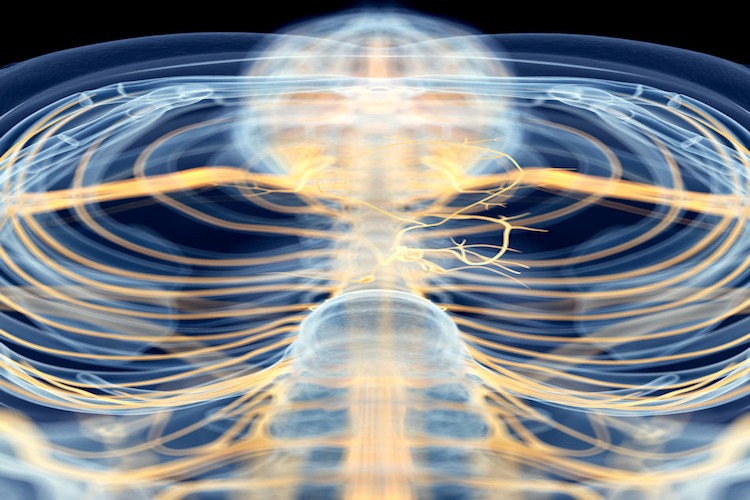Vagus Nerve Stimulation and it’s Many Benefits
Mindd Foundation

Vagus Nerve Stimulation May Be the Key to Improving Your Health.
Inflammation is the underlying cause of most diseases as the immune system launches an inflammatory response to protect cells when it senses danger. However, detecting the initial cause of that inflammation can prove to be the more significant challenge.
The Vagus Nerve connects to many body systems and has a significant influence on systemic inflammation and overall health.
Exploring the Vagus Nerve and its Functions
This article examines why the Vagus Nerve is essential and how it functions to contribute to health including:
- Why the Vagus Nerve is important
- How the Vagus Nerve impacts health
- Signs and symptoms of Vagus Nerve dysfunction
- Vagus Nerve Stimulation and its benefits
- An important note on gluten and the Vagus Nerve
Why the Vagus Nerve Is Important
Derived from the Latin word vagus, which means “to wander,” the Vagus Nerve holds true to its name. The Vagus Nerve extends from its roots in the cerebellum and brainstem, winds through the body, and branches multiple times to innervate all of the following major organs:
- the pharynx
- larynx
- heart
- esophagus
- stomach
- small intestine and
- large intestine up to its splenic flexure
This extended reach results in the Vagus Nerve playing a role in functions such as taste, swallowing, speech, heart rate, digestion, and excretion.
The Vagus Nerve serves as an irreplaceable member of the parasympathetic nervous system, or PNS, which is associated with physiological activities categorized as, “rest and digest.”
As its name implies, the PNS specializes in calming the body down and digesting food to restore the body’s energy supply among other functions. To achieve this, the Vagus Nerve communicates with its associated organs by releasing a neurotransmitter called acetylcholine which helps facilitate blood pressure regulation, blood glucose balance, heart rate, taste, digestion, breathing, crying, sweating, kidney function, bile release, saliva secretion, female fertility, and orgasms.
Hormones throughout the body are also engaged with the Vagus Nerve. Insulin decreases glucose release from the liver to stimulate the Vagus Nerve whereas thyroid hormone, T3, stimulates the Vagus Nerve to increase appetite and the production of ghrelin. Ghrelin also stimulates the Vagus Nerve to increase hunger.
Vagus Nerve function is essential to the release of oxytocin, testosterone, and vasoactive intestinal peptide. The production of growth hormone releasing hormone, GHRH, and the activation of parathyroid hormone for converting vitamin D3 to active vitamin D also rely on the Vagus Nerve.
How the Vagus Nerve Impacts Mental and Physical Health
Although the Vagus Nerve affects organs outside of the central nervous system, or CNS, which consists of the brain and spinal cord, it is important to remember that the Vagus Nerve is rooted in the brainstem and cerebellum. Optimal Vagus Nerve function, or “high vagal tone index,” is associated with strong social connections, positive emotions, and better physical health. Individuals with low vagal tone index experience depression, heart attacks, loneliness, negative feelings, and stroke.
Brain health and gut health influence one another and the Vagus Nerve is precisely the link between the two. The vagal tone index can be thought of as the body’s “gut feeling” that gets conveyed directly to the brain and produces a feedback loop of more positivity or more negativity.
Emerging studies indicate that the vagal tone index is determined by signals released from the immune system called cytokines. Research is underway to better understand how stimulating the Vagus Nerve offers the potential for treating inflammatory conditions, such as rheumatoid arthritis, without the use of pharmaceutical drugs.
Signs and Symptoms of Vagus Nerve Dysfunction
Given the extensive connections between the brain and gut via the Vagus Nerve and its branches, there are numerous regions vulnerable to dysfunction. These regions can be grouped into three main areas:
- Communication within the brain
- Communication from the brain to other organs
- Communication from other organs to the brain
Depending on which area is afflicted, Vagus Nerve dysfunction may manifest as:
- Aggression
- Anxiety
- Brain fog
- Chronic inflammation
- Delayed stomach emptying
- Depression
- Difficulty swallowing
- Dizziness or fainting
- Fatigue
- Heart rate changes (high or low)
- Heartburn
- Irritable Bowel Syndrome (IBS)
- Vitamin B12 deficiency
- Weight gain
Left undiagnosed or untreated, Vagus Nerve dysfunction can lead to more serious diseases including:
- Alcohol addiction
- Autism
- Bulimia
- Cancer
- Chronic heart failure
- Fibromyalgia
- Heart disease
- Leaky Gut Syndrome
- Memory disorders or Alzheimer’s disease
- Migraines
- Mood disorders
- Multiple Sclerosis (MS)
- Obesity
- Obsessive Compulsive Disorder (OCD)
- Poor blood circulation
- Tinnitus
Avoiding diseases and lifestyle choices that damage the Vagus Nerve is essential to keeping the above signs and symptoms at bay. These include alcoholism, anxiety, diabetes, fatigue, physical damage to the Vagus Nerve, poor posture, and stress.
Vagus Nerve Stimulation and Its Benefits
Vagus Nerve dysfunction typically results from a low vagal tone index, so stimulating the Vagus Nerve can operate as a treatment for the signs, symptoms, and diseases listed above. Many of these forms of treatment represent lifestyle changes meaning it is safe to adopt more than one of the following practices to increase the vagal tone index.
- Add seafood to the diet
The EPA and DHA found in seafood stimulate the Vagus Nerve to increase heart rate variability and lower heart rate. These effects can be obtained from a fish oil supplement as well. - Become a yogi
Yoga not only boosts mood and lowers anxiety but also increases Vagus Nerve and parasympathetic system activity. The slow, deep breathing associated with yoga activates highly sensitive pressure receptors in the heart and neck called baroreceptors which send signals to the brain telling it to activate the Vagus Nerve. - Build social connections
Research shows social relationships make individuals feel closer to others, and that feeling stimulates the Vagus Nerve. - Chew gum
Chewing gum boosts the release of the hormone, CCK, from the gut which helps facilitate communication from the Vagus Nerve to the brain. - Cough or contract the stomach muscles
The sensation felt while coughing or having a bowel movement is produced by the Vagus Nerve, so reenacting these activities stimulates the Vagus Nerve. - Eat more fiber
Fiber increases GLP-1, a hormone that supports communication between the Vagus Nerve and brain, slows stomach emptying and makes the body feel full longer. - Engage the larynx
Activities like singing, gargling, or even activating the gag reflex, engage the larynx thereby stimulating the Vagus Nerve. For assistance with activating the gag reflex, use a tongue depressor or spoon. - Exercise regularly
Exercise stimulates the Vagus Nerve to stimulate gut flow thereby benefiting the vagal index along with excretion. - Fast intermittently
Intermittent fasting reduces the number of calories consumed. That reduction in calories causes heart rate variability to spike and metabolism to plummet—two events that trigger Vagus Nerve function.
Find an acupuncturist
Traditional acupuncture, especially to the ear, stimulates the Vagus Nerve. - Get direct sunlight
UVA rays increase the body’s levels of melanocyte stimulating hormone (MSH), another hormone that stimulates the Vagus Nerve. UVB rays increase the number of MSH receptors throughout the body making it possible for even more MSH to bind. - Incorporate prayer every day
Studies show praying stimulates the Vagus Nerve by increasing diastolic blood pressure and heart rate variability. These effects enhance overall cardiovascular health. - Laugh often
The connection between laughter and vagal tone was first discovered as a result of people fainting from events that involve the body bearing down such as coughing, laughing, moving the bowels, swallowing, and urinating. The fainting results from other syndromes involving the Vagus Nerve, but in healthy individuals, laughter supports better cognition while preventing heart disease. - Learn to love cold temperatures
Adjusting to temperatures colder than average body temperature triggers the PNS into action via Vagus Nerve Stimulation. This effect is best achieved by drinking cold water, dipping the face in cold water, or taking cold showers. - Meditate daily
Meditating to promote love and kindness within the spirit increases the vagal tone index. Om chanting is an alternative method of meditation that produces the same effect. - Practice Tai Chi
Studies show Tai Chi increases heart rate variability indicating it achieves this by activating the Vagus Nerve. - Have massages often
Neck and foot massages stimulate the Vagus Nerve while reducing the risk of seizures and heart disease, respectively. Whole body pressure massages stimulate gut function which indirectly activates the Vagus Nerve. - Sleep on the right side
Lying on the back decreases Vagus Nerve activation, but sleeping on the right side shows greater Vagus Nerve stimulation compared to left side sleeping. - Spend some time with Nervana
Nervana is a form of technology designed to stimulate the Vagus Nerve via electrical waves synced with music. Available as a one-sided generator or dual-sided headphones, Nervana triggers neurotransmitter release from the brain and induces calm within the mind and body. - Supplement zinc and serotonin (5-HTP)
Zinc is crucial to Vagus Nerve function, and many people are unknowingly deficient in this mineral. Serotonin activates the Vagus Nerve through several different receptors in the body. - Take a probioticOptimising gut health is ideal for maximizing Vagus Nerve Stimulation. Taking a probiotic can ensure this especially the probiotic, Lactobacillus rhamnosus, which improved the function of GABA receptors for the Vagus Nerve in animal studies.
- Try an enema
Expediting the movement of the bowels expands the intestines and activates Vagus Nerve activity. - Use Pulsed Electromagnetic Field (PEMF) therapy
Research confirms that magnetic fields stimulate the Vagus Nerve by increasing heart rate variability. Using a device that stimulates pulsed magnetic field waves directly on the gut, head, and neck will target the Vagus Nerve. - Work the vocal chords
Chanting, humming, singing, talking, and other vocal chord exercises increase heart rate variability which activates the Vagus Nerve.
An Important Note on Gluten and the Vagus Nerve
Individuals sensitive to gluten can experience inflammation and brain disorders including anxiety, autism, ADHD, bipolar disorder, depression, schizophrenia, Alzheimer’s disease, or Parkinson’s disease.
Such gluten sensitivity also disrupts gut health resulting in a reduced vagal index. So, ceasing consumption of gluten is yet another way to stimulate the Vagus Nerve while supporting gut health and reducing inflammation in the brain.
Studies show Vagus Nerve stimulation also lowers blood pressure, decreases heart rate, reduces the body’s response to stress, and improves digestion.
Beyond Gluten-free Foods
Consuming a gluten-free diet goes beyond seeking gluten-free foods. The ideal gluten-free diet incorporates antioxidant-rich foods and other foods rich in ubiquinone and acetyl-L-carnitine which protect the brain from oxidative damage. An Integrative Health Practitioner can provide some excellent dietary options for maintaining a gluten-free diet.
References
Bergland, C. (2016, July). Vagus Nerve stimulation dramatically reduces inflammation. Retrieved from Psychology Today at https://www.psychologytoday.com/us/blog/the-athletes-way/201607/vagus-nerve-stimulation-dramatically-reduces-inflammation
Cohen, J. (2018, May). 32 Vagus Nerve stimulation tips + functions and disorders. Retrieved from Self Hacked at https://www.selfhacked.com/blog/32-ways-to-stimulate-your-vagus-nerve-and-all-you-need-to-know-about-it/
Kresser, C. (2017, May). Is gluten killing your brain? Retrieved from Kresser Institute at https://kresserinstitute.com/gluten-killing-brain/
Ropp, T. (2017, September). 12 Ways to unlock the powers of the Vagus Nerve. Retrieved from Uplift at https://upliftconnect.com/12-ways-unlock-powers-vagus-nerve/
Shaw, E. (2017, November). How toning the Vagus Nerve heals pain. Retrieved from Uplift at https://upliftconnect.com/toning-vagus-nerve-heals-pain/







